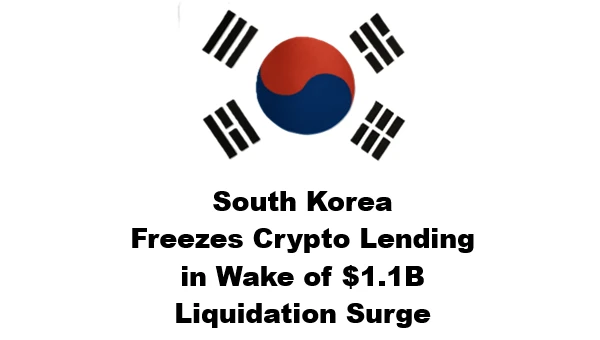

For six weeks, a frenzy of crypto borrowing swept across Korea. Major exchanges like Upbit and Bithumb unleashed tempting lending programs, allowing investors to borrow big against their crypto holdings. The response was immense: 27,600 people piled in, borrowing an astonishing 1.5 trillion won ($1.1 billion). But the bubble quickly burst.
When prices dropped, about 13% of those borrowers, roughly 3,600 accounts, were liquidated in a flash sale.

This financial shockwave rattled the market and forced regulators to act fast. Experts warned that without intervention, those forced liquidations could have triggered a domino effect across the market.
Officials stressed that lending services had emerged in a legal blind spot. Collateral-based crypto loans were expanding without clear oversight, raising the risk of cascading sell-offs. The FSC noted unusual stress in stablecoin markets, with USDT briefly mispriced on local platforms when liquidation waves hit. This confirmed that unchecked leverage could spill into broader trading activity, creating systemic vulnerabilities.
For regulators, the warning signs resembled past crises in shadow banking, where innovations outpaced safeguards. Comparisons were even drawn to 2008, when opaque credit markets magnified risks for ordinary investors.
The FSC emphasized that the freeze is temporary. It has established a joint task force with the Financial Supervisory Service (FSS) to draft binding rules. Among measures under discussion are leverage caps, borrower eligibility tests, and mandatory risk disclosures. Exchanges have been warned to comply fully or face audits and penalties.
By stopping new loans now, authorities hope to prevent further losses while they build a safer long-term structure for the industry. Several experts believe new rules could mirror securities standards, requiring investor categorization and transparency on lending terms.
This clampdown contrasts with South Korea’s recent moves to expand institutional crypto access. Earlier this year, regulators approved limited participation by charities, universities, and investment firms, underscoring their openness to carefully managed adoption. The lending freeze, however, targets speculative retail borrowing that regulators see as disproportionately risky.
By segmenting policy, South Korea is signaling a willingness to nurture institutional growth while restraining unsustainable retail leverage. It also reflects the government’s recognition that retail enthusiasm, while valuable, cannot come at the cost of financial stability.
South Korea’s actions align with a wider global debate on crypto lending. In the United States, firms like BlockFi and Celsius drew scrutiny for similar products that later collapsed under market pressure. European regulators, meanwhile, have pushed for uniform rules under MiCA to govern lending and staking services. In Asia, Singapore and Japan have tightened standards on leverage and disclosure.
Against this backdrop, Korea’s freeze positions it as proactive rather than reactionary, aiming to learn from international failures before they cascade locally. It highlights how different regions are converging on the view that crypto lending cannot remain an unregulated frontier.
The immediate effect has been a cooling of speculative sentiment in the Korean crypto sector. Trading volumes dipped on Upbit and Bithumb as investors recalibrated their strategies. Some exchanges have publicly pledged to cooperate with regulators, framing the pause as a chance to restore confidence. Others have expressed concern that prolonged restrictions could stifle innovation or drive users to offshore platforms.
Market analysts argue that, in the short term, stability may outweigh lost revenue, especially after reputational damage caused by sudden liquidations.
If new rules are balanced, exchanges may ultimately benefit from greater trust and participation by cautious investors.
Looking Ahead
The next phase hinges on how quickly the FSC finalizes its guidelines. Draft rules are expected in the final quarter of 2025, with full enforcement likely in 2026. Key questions remain: what leverage limits will be imposed, will retail investors face caps on participation, and how will enforcement interact with global exchanges serving Korean clients? The answers will shape whether Korea emerges as a model for balanced crypto oversight or risks dampening innovation.
For now, the message is clear: unchecked crypto lending will no longer proceed in the shadows, and investor protection has become the regulator’s top priority.
The international industry will be watching closely, as Korea’s decision may set a precedent for how emerging markets handle the double-edged sword of financial innovation and consumer protection.
He has worked with several companies in the past including Economy Watch, and Milkroad. Finds writing for BitEdge highly satisfying as he gets an opportunity to share his knowledge with a broad community of gamblers.
Nationality
Kenyan
Lives In
Cape Town
University
Kenyatta University and USIU
Degree
Economics, Finance and Journalism


Facts Checked by Vlad Hategan

 Fact checked by
Fact checked by 
 eabungana@gmail.com
eabungana@gmail.com 